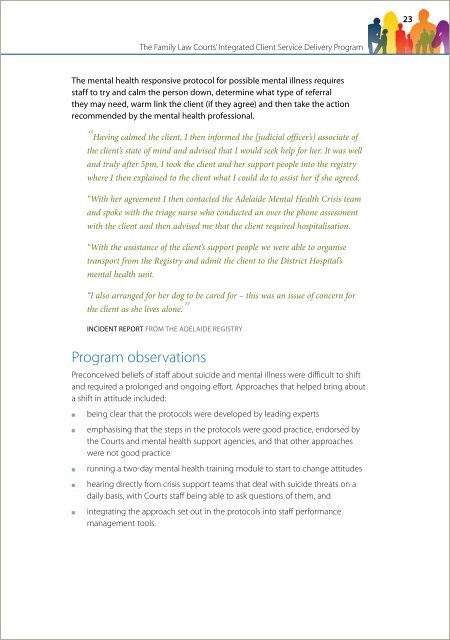Integrated client service delivery, featuring mental health support ...
Integrated client service delivery, featuring mental health support ...
Integrated client service delivery, featuring mental health support ...
Create successful ePaper yourself
Turn your PDF publications into a flip-book with our unique Google optimized e-Paper software.
23The Family Law Courts’ <strong>Integrated</strong> Client Service Delivery ProgramThe <strong>mental</strong> <strong>health</strong> responsive protocol for possible <strong>mental</strong> illness requiresstaff to try and calm the person down, determine what type of referralthey may need, warm link the <strong>client</strong> (if they agree) and then take the actionrecommended by the <strong>mental</strong> <strong>health</strong> professional.“Having calmed the <strong>client</strong>, I then informed the [judicial officer’s] associate ofthe <strong>client</strong>’s state of mind and advised that I would seek help for her. It was welland truly after 5pm, I took the <strong>client</strong> and her <strong>support</strong> people into the registrywhere I then explained to the <strong>client</strong> what I could do to assist her if she agreed.“With her agreement I then contacted the Adelaide Mental Health Crisis teamand spoke with the triage nurse who conducted an over the phone assessmentwith the <strong>client</strong> and then advised me that the <strong>client</strong> required hospitalisation.“With the assistance of the <strong>client</strong>’s <strong>support</strong> people we were able to organisetransport from the Registry and admit the <strong>client</strong> to the District Hospital’s<strong>mental</strong> <strong>health</strong> unit.“I also arranged for her dog to be cared for – this was an issue of concern forthe <strong>client</strong> as she lives alone.”Incident report from the Adelaide RegistryProgram observationsPreconceived beliefs of staff about suicide and <strong>mental</strong> illness were difficult to shiftand required a prolonged and ongoing effort. Approaches that helped bring abouta shift in attitude included:nnnnnbeing clear that the protocols were developed by leading expertsemphasising that the steps in the protocols were good practice, endorsed bythe Courts and <strong>mental</strong> <strong>health</strong> <strong>support</strong> agencies, and that other approacheswere not good practicerunning a two-day <strong>mental</strong> <strong>health</strong> training module to start to change attitudeshearing directly from crisis <strong>support</strong> teams that deal with suicide threats on adaily basis, with Courts staff being able to ask questions of them, andintegrating the approach set out in the protocols into staff performancemanagement tools.
















